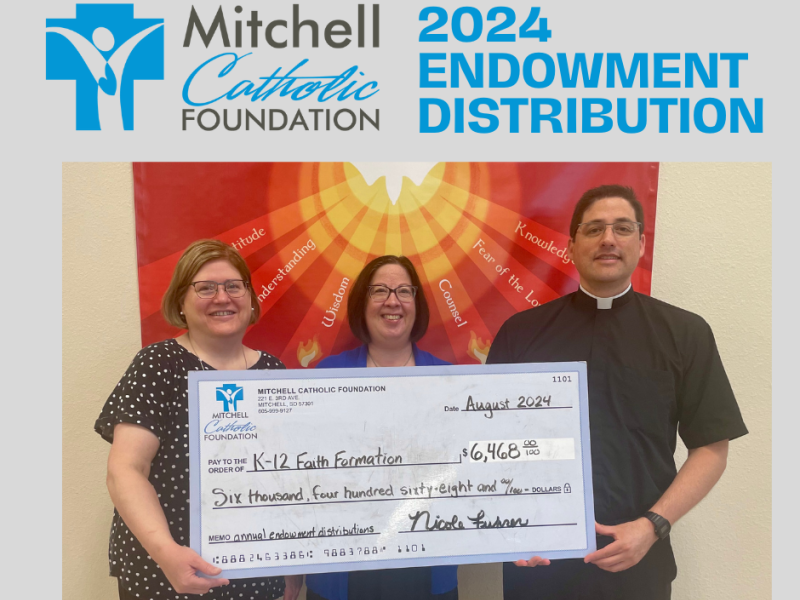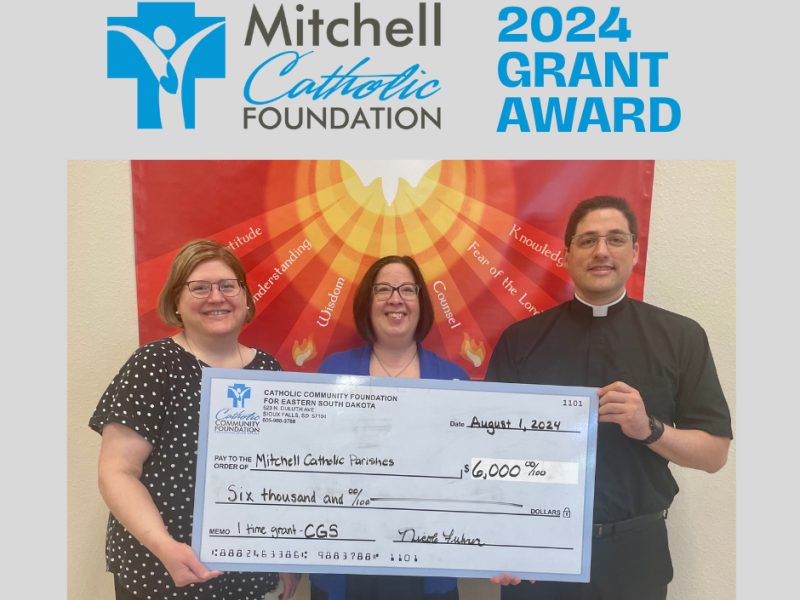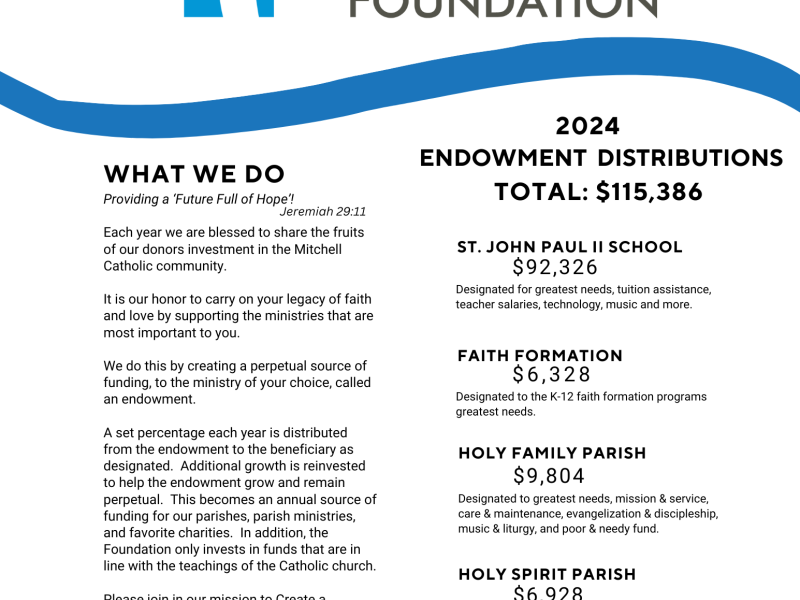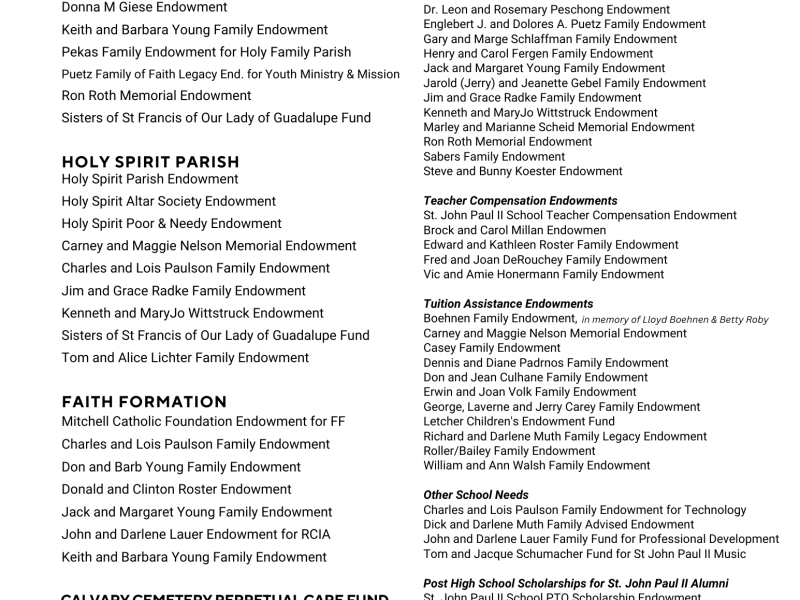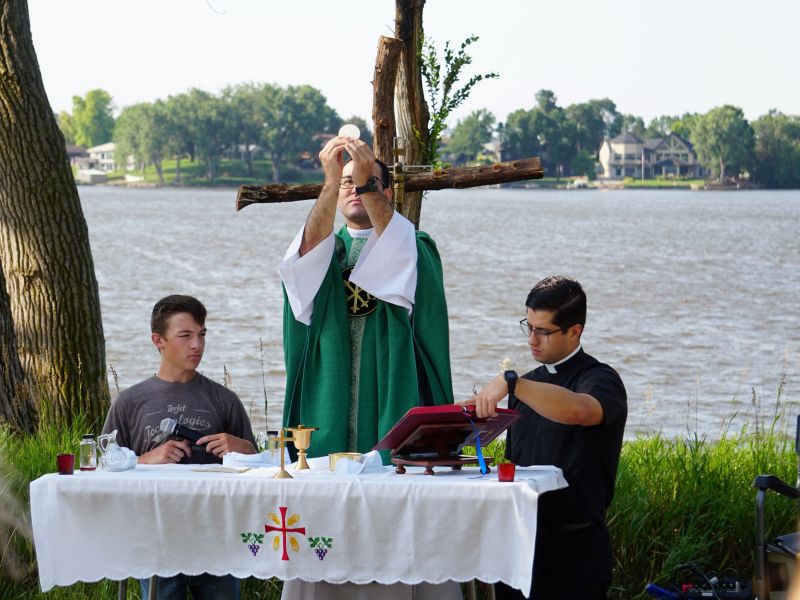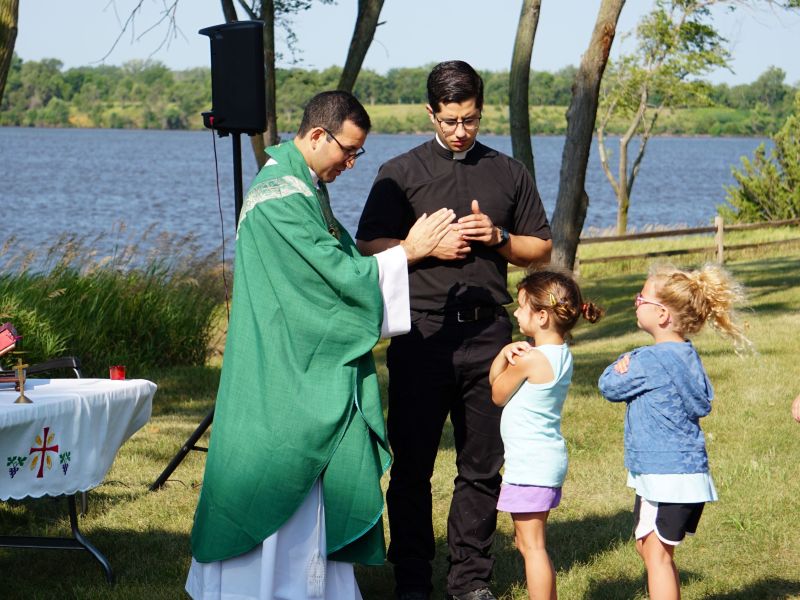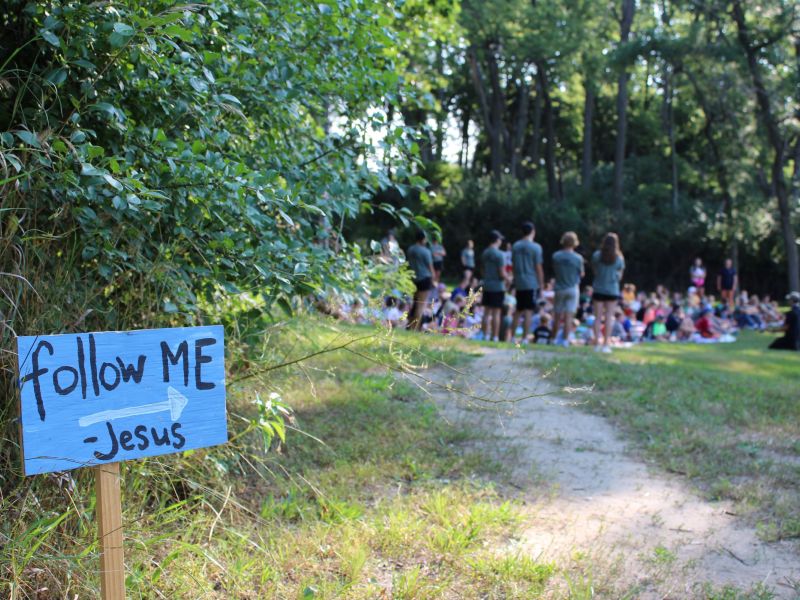
The Mitchell Catholic Foundation presented $115,386 in endowment distributions to the ministries of Mitchell Catholic Parishes for 2024.
The endowment distributions included $92,326 for St. John Paul II School to aid in tuition assistance, teacher salaries, technology, music, and other areas of need; $6,328 for Faith Formation to aid in program needs; $9,804 for Holy Family Parish for mission and service, facility maintenance, evangelization and discipleship, music, poor and needy assistance, and other needs; and $6,928 for Holy Spirit Parish for care and facility maintenance, poor and needy assistance, and other areas of need.
Endowment distributions are the interest earned on initial investment funds donated by families or individuals.
“A set percentage each year is distributed from the endowment to the beneficiary as designated. Additional growth is reinvested to help the endowment grow and remain perpetual,” says Nicole Fuhrer, Gift Planning Officer for the Mitchell Catholic Foundation. “This becomes an annual source of funding for our parishes, parish ministries, and favorite charities.”
Endowments managed by the Foundation are only invested in funds that are in line with the teachings of the Catholic church. Donations can be made to an existing endowment fund, or anyone can start an endowment in their name or the name of a loved one.
“It is our honor to carry on your legacy of faith and love by supporting the ministries that are most important to you,” says Fuhrer.
Mitchell Catholic Parishes also received an additional $6,000 grant from the Catholic Community Foundation for Eastern South Dakota to launch Catechesis of the Good Shepherd in our parishes this fall.
For more information on giving or the Mitchell Catholic Foundation, contact Nicole Fuhrer at 605-999-9127 or

Introducing…St. John Paul II School’s new logo!
The new logo is a fruit of the Rise Up Strategic Plan as overseen by the Increased Enrollment Pillar. Funding from the Bids for Kids Fund-a-Need allowed the Increased Enrollment committee to work with Logoworks to develop the new logo, which was also very cost-effective.
The logo includes an illuminated cross, reminding us of Jesus Christ’s one true Catholic Church as our foundation. The colors red and blue complement our red uniforms and represent our pastorate of Holy Family and Holy Spirit Catholic Churches who have traditionally used blue and red, as represented in the Mitchell Catholic Parishes logo. The tagline “Guided by Faith, Driven by Excellence” reaffirms the strategic objectives of our Rise Up Strategic Plan and vision for the Mitchell Catholic Pastorate as a whole.
For more information on the Rise Up Strategic Plan, visit St. John Paul II's website.

Description
Exciting Opportunity for a Passionate Administrative Assistant at Mitchell Catholic Parishes!
Are you a motivated, organized, and enthusiastic individual looking to make a meaningful impact in a warm and welcoming community? Mitchell Catholic Parishes invites you to join our dedicated team as an Administrative Assistant!
Hours: 30-40 hours per week
Pay: Starting at $17/hour
Benefits: Benefit eligible-Health, Life, Dental, Disability, Retirement
Schedule: Normal office hours, no scheduled overtime
Environment: Friendly, supportive, and flexible
About Us: At Mitchell Catholic Parishes, we are committed to fostering a welcoming and supportive environment. Our team is dedicated to serving with compassion and integrity, and we’re excited to welcome a new member who shares our values and enthusiasm. Why we exist-to boldly proclaim the gospel, to receive God’s healing grace, and to live out our call to holiness. What we do-we celebrate the sacraments, form disciples, foster community, and serve those in need.
Your Role: As an Administrative Assistant, you will be the heart of our parish office, providing crucial administrative support with a warm and friendly demeanor. From managing correspondence to organizing parish events, your role will be vital in helping our parishes thrive. If you have a passion for organization and a love for making a difference, this is the perfect opportunity for you!
Why You'll Love Working with Us:
- Meaningful Work: Contribute to a faith-driven community and support our mission in every task you undertake.
- Positive Environment: Enjoy a friendly and supportive office atmosphere where every team member is valued.
- Flexibility: We offer a flexible schedule within normal office hours, ensuring a healthy work-life balance.
What We’re Looking For:
- An enthusiastic, friendly, reliable, and detail-oriented individual
- Strong organizational, computer, and communication skills
- A proactive attitude with a passion for supporting our parish community
- Previous experience in an office setting is a plus, but not required
- Willingness and ability to effectively make known the Catholic Church’s teachings through the varied ministry activities expected of this position.
- Willingness and ability to act as an outstanding personal witness to the Catholic faith and religion by living both one’s professional and personal life in accordance with the doctrines and moral teachings of the Roman Catholic Church, as embodied in the various documents of the Roman Catholic Church, including, without limitation, the Catechism of the Roman Catholic Church.
If you’re eager to join a team that celebrates faith and community while offering a supportive and flexible work environment, we’d love to hear from you!
To Apply: Please send your resume and a brief cover letter explaining why you’d be a great fit for our team to
Join us at Mitchell Catholic Parishes and be a part of something truly special. Apply today!

Piano Lesson Starting Fall 2024
After school piano lessons will be offered for registered families of Mitchell Catholic Parishes or children attending St. John Paul II School.
Registrations are being accepted now through August 21 (first day of school).
Lessons will begin in September and run through April. Connect with Valerie Johnson at
Registration forms and printed information are available below or at the Holy Family office.

The third annual Little Catholics Bible Camp was held at Camp Arroya on Lake Mitchell, SD from July 29-31 with the theme “Here I am Lord – Send me!”
The camp had a record attendance of over 115 campers in grades K-8 and over 30 volunteers, counselors, and leaders including both students and adults. This year, the camp expanded to include middle school.
The camp included outdoor Mass, daily chapel, crafts, nature hikes, fishing, “Saints & Science” experiments, outdoor cooking, knot-tying, games, archery, kayaking and lunch, where all the students sat down together and prayed before eating.
Camp Leader and educator Sarah Timmer began the camp in 2022 as a way to share her fond memories of camp growing up and her love of Jesus. Thank you to all the volunteers and leaders, and special thank you to those who donated time or resources to make the activities possible, including Ron’s Bike Shop, Cabela’s, Boy Scouts, and John & Linda McLeod.



